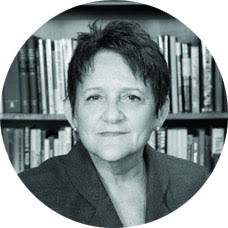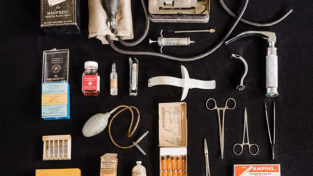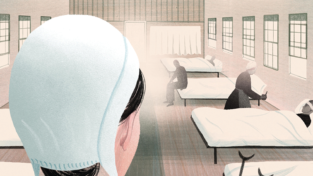Giving — and receiving — compassionate care as a medical professional
AS A DOCTOR-IN-TRAINING in the late 1970s, I sat in a room on the inpatient psychiatric unit with a man who was clinically depressed. It was my duty to work with him, listen to him, offer him what I might and report back to my supervising physician. Yet all I could do was feel sorry for him for being assigned to me. What could I possibly offer this unfortunate man? Unlike most of my medical school colleagues, I imagined, I knew firsthand what he was feeling.
I was not yet learned enough in my clinical skills to be able to separate my personal self from the patient. I dragged myself to each session with him, putting on a brave and moderately neutral face, while underneath I was sinking, hoping that no one would notice. Then I would return to my apartment at night and curl up in a ball, waiting to be relieved of this rotation and my time with this patient.
I was 25 and thrilled to be in medical training — my lifelong dream. I could not understand how I could possibly be depressed when I was doing something that I so loved and strove for. As I know now, but did not appreciate then, those two experiences can coexist.
Treatment options for depression in the 1970s were markedly different than they are now. Mental health services have historically been reflective of our understanding of mood disorders. We now recognize depression as a biologically based illness of the mind and body that has a genetic basis and that can be managed over a lifetime. In contrast to what was offered decades ago, there is an array of new medications and psychotherapists skilled in talk therapy, such as cognitive behavior therapy and mindfulness, and somatic treatments, such as transcranial magnetic stimulation and electroconvulsive therapy.
As a trainee, receiving any mental health treatment was unimaginable. I quickly learned that I should not speak of these issues to anyone for fear of being considered too weak and impaired to continue in the program and thus lose my cherished spot. I could not open up to my fellow classmates, residents or supervising attending physicians. The attendings were my teachers in substance and also by example, showing me how to be a caring and functioning physician with the requisite qualities of knowledge, strength and empathy. It was ironic that I did not feel able to approach them for the help I needed.
Student health services was definitely off limits for treating my depression, for I feared that my condition would leak out to the dean’s office. Therapy was unheard of and perceived as unnecessary by my family, who didn’t acknowledge my illness as legitimate and thus were not willing to finance expensive treatment. Given the culture of the medical profession at the time, I could never have asked for the time off from my duties to attend even one mental health appointment.
My only choice was to be hypervigilant, lest my secret be exposed and held against me. The reality of no support and no treatment was very isolating. And another 20 years would pass before I received my first evaluation and treatment at age 45.
While the hallmark of my professional life has been compassion and understanding toward others, for years I could not expect to receive the same in return. I felt private emotional pain and simultaneously found myself caring for and counseling those who had the very same illness as I.
I’m better now. I survived, thanks to a team of extraordinary and dedicated mental health professionals who work overtime on my behalf. Although stigma still exists around depression, the medical profession and society in general have become more open and accepting of those who have a mental illness. But we’re not quite there yet — our progress is not enough.
 Susan J. Noonan ’75 MD is the author of “Take Control of Your Depression: Strategies to Help You Feel Better Now” and a consultant at Massachusetts General Hospital and McLean Hospital.
Susan J. Noonan ’75 MD is the author of “Take Control of Your Depression: Strategies to Help You Feel Better Now” and a consultant at Massachusetts General Hospital and McLean Hospital.
This article appeared as “Healing Others. Healing Self.” in the spring 2019 issue of the Alumnae Quarterly.
May 14, 2019











thank you for your comment! Experiences like this can make us feel alone in our lives, which is why I wrote this piece. We are not alone. If only we had the strength to speak up, we would better understand this. Stay well!
Thank you so much for sharing this! As an alumna who aspired a career in psychiatry and first became interested in mental health at MHC, I found myself conflicted when I realized I could not talk about my struggles with my own mental wellness during my research training. Mass General’s Department of Psychiatry has the most amazing people who I miss working with. I wish I had communicated with my amazing mentor about my prior experience working with an abusive supervisor. The occasionally abusive culture in medical/research training (it really is sheer luck!) is a trigger for mental health problems and oftentimes as trainees we feel we couldn’t speak out. As a result, distrust builds up and people risk burnouts, missing the opportunity to correct ruminative negative thinking to cultivate future healthy mentor-mentee relationships. We appreciate people who are in established positions as you are who speak our voice. It is still a stigma and a sign of “emotional instability” in a culture where grits and resilience are emphasized, where no weakness seems to be expected.